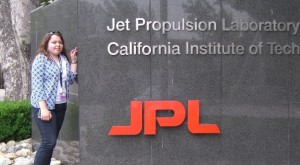By Michele Tallarita ’12

Jaclyn Avidon '12 in California
In the depths of outer space millions of miles from Earth, Jupiter and its many moons make their slow turn around the sun. One of the planet’s largest moons, Europa, bears a pale surface full of crisscrossing lines, like bicycle tracks, and has temperatures several hundred degrees below our planet’s coldest destinations.
In the 100-degree heat of Pasadena, Calif., Jaclyn Avidon ’12 is working to learn more about Europa and other moons like it. This summer, Avidon is interning at NASA’s Jet Propulsion Lab at the California Institute of Technology, where she’s conducting experiments concerning the surfaces of the moons.
“Many moons in the outer solar system, such as Jupiter’s moon Europa and Saturn’s moon Enceladus, are thought to have an icy surface layer,” she says. “The project I’m working on studies the thermal and physical properties of this outer icy layer in hopes of obtaining better models of these moons’ geological development.”
A physics major, Avidon (New York, N.Y.) is making “icy samples” similar to the moons’ surfaces in the lab, then measuring the samples’ thermal properties using a tool that resembles a mini-fridge.
Avidon’s passion for physics and astronomy began in the ninth grade, when she took her first physics class and loved it. Now, she plans on going to graduate school for a Ph.D. in planetary science. Winding up back at the Jet Propulsion Lab, she says, would be a dream come true.
“JPL is the epicenter for all space missions that fly out to study the planets, so being here is really inspiring and exciting,” she says. “Also, the science-writing skills, hands-on experimental skills, and research skills I’ve gained here are extremely valuable.”
Back on campus, Avidon has performed research on the temperature of Europa with Andrew Dougherty, associate professor and head of physics, is the president of the Physics Club, and participates in a different kind of physics—dance. She’s also a campus tour guide, and will begin writing a thesis next semester based on her physics research.
After this summer, Avidon will have already contributed to the physics community. “It’s really rewarding to know that future geophysical models will be laid out based on some of the data that you helped gather,” she says.
